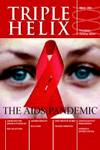On 1 December 2003 Joanna Jepson (right) was granted permission to launch a judicial review concerning a case of late abortion of a fetus diagnosed with cleft lip and palate. Miss Jepson originally approached the West Mercia police in October 2002, who declined to investigate the termination after obtaining a letter from the vice president of the RCOG in support of this decision.
Miss Jepson, a recently ordained Anglican curate, was herself born with a congenital jaw defect that was repaired in her late teens. Having endured the inevitable taunts of other adolescents, she has emerged - after three operations over two years - as the 'ugly duckling turned prom queen' and will stand in court to challenge the vacuity of a culture that worships physical perfection.
Ardent supporters of abortion see the case as a women's rights issue. Ann Furedi, Chief Executive of the British Pregnancy Advice Service (BPAS) claims that the law was, '...deliberately left...vague for the decision to be made between the woman and her doctors... what some people regard as extremely serious, and a condition they really feel they could not live with in a child, others would feel differently about.'[1] She has argued elsewhere that the choice to abort should be open to a woman at any stage of pregnancy for any reason.[2]
Others, like Jepson, see the case as challenging societal attitudes towards disability: 'I hope we shall succeed... and recognise once again the value and dignity of our common humanity, disabled or able-bodied, no matter what we look like.'[3] Her view of disability is informed by her own experience and that of her brother Alastair, who has Down's Syndrome - currently the most common fetal abnormality cited as grounds for abortion.
Questions about how 'serious handicap' should be defined were asked in the abortion debates of 1966, but left unanswered. They were asked again when the Abortion Act was amended in 1990 by the HFE Act to allow abortion up until birth on these grounds. Predictions that hare lip or a cleft palate might be included were described as 'a gross calumny on the medical profession' by Sir David Steel, and 'pure scaremongering' by others.[4] The on-the-record intentions of legislators are always to provide for extreme situations. I wonder whether, off-the-record, they are pleased or dismayed at the practical outworking of their regulations - are they surprised or had they expected it all along?
Regardless, this case provides a real opportunity to gain back some of the ground lost in the protection of the unborn since 1967. We must pray that it succeeds.
































